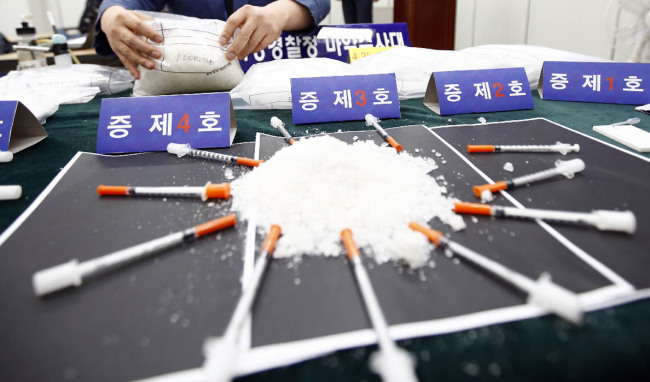Foreign-educated children of rich families caught taking illegal drugs
By YonhapPublished : April 3, 2019 - 13:53
A growing number of foreign-educated young scions of South Korea's conglomerate owner and wealthy families are making scandalous headlines these days for using banned substances.
Many of the well-heeled Korean students gain easy access to prohibited substances while studying in foreign countries with loose drug laws and are caught for drug law violations in South Korea unable to quit the habit after returning home, police investigators said Wednesday.
Many of the well-heeled Korean students gain easy access to prohibited substances while studying in foreign countries with loose drug laws and are caught for drug law violations in South Korea unable to quit the habit after returning home, police investigators said Wednesday.

Earlier this week, police in Incheon, west of Seoul, requested an arrest warrant for a grandson of SK Group founder Chey Jong-gun on charges of buying and using liquid marijuana in violation of the Narcotics Control Act.
The 31-year-old grandson, whose name has been withheld, is suspected of making 15 purchases of liquid marijuana, which is illegal in South Korea, between March and May last year.
The disgraced SK scion attended a university in the United States.
A 27-year-old Korean man identified only as Lee, who was arrested by police last month on charges of selling drugs to Chey, also studied abroad, according to reports.
Police investigating Lee's case said they have confirmed circumstances that a 28-year-old grandson of Hyundai Group founder Chung Ju-yung also bought the banned substance from Lee.
Chung reportedly met Lee while studying abroad.
Lee was quoted as confessing to police that he came to know Chung during their overseas study and they smoked marijuana together. Chung is now staying abroad.
As the cases of Chey and Chung unfolded, allegations have surfaced that children of owners of a famous apparel manufacturer and retailer, and a renowned stationery company used drugs while studying abroad.
According to an informant, the children disclosed their use of narcotics to their acquaintances while attending a foreign university between 2017 and 2018.
In addition, there have been numerous cases of foreign-educated Korean students being caught secretly attempting to buy drugs or smuggling them into the country.
In 2015, a number of Korean students educated or staying in the US, Australia, Britain and New Zealand were arrested for buying cannabis from a Seoul man who grew the banned substance inside his apartment.
In September of the same year, a group of 21 Koreans who attended US universities were booked by police in Gyeonggi Province on charges of smoking cannabis. Some of the suspects reportedly studied in a US state where smoking marijuana is not illegal.
In March last year, a ring of 14 Koreans were arrested for smuggling drugs into the country and reselling them in return for bitcoin. The suspects, most of them educated abroad, were accused of buying about 8 kilograms of cannabis and hashish from India and the US between May 2016 and September 2017.
Police said the smuggling of illegal drugs from some foreign countries, where marijuana is not illegal, has increased in recent years.
According to the customs office in Incheon, the number of seizures of drugs smuggled from North America surged 303 percent from the previous year to 242 cases last year.
At present, in some US states, including California, Oregon and Nevada, the consumption of cannabis is legal for medical and recreational use. Canada also legalized hemp trading last October.
In South Korea, however, the use of marijuana is still illegal and violators can be punishable with an imprisonment of less than five years or a fine of less than 50 million won ($44,100). (Yonhap)






![[KH Explains] How should Korea adjust its trade defenses against Chinese EVs?](http://res.heraldm.com/phpwas/restmb_idxmake.php?idx=644&simg=/content/image/2024/04/15/20240415050562_0.jpg&u=20240415144419)












![[Today’s K-pop] Stray Kids to return soon: report](http://res.heraldm.com/phpwas/restmb_idxmake.php?idx=642&simg=/content/image/2024/04/16/20240416050713_0.jpg&u=)